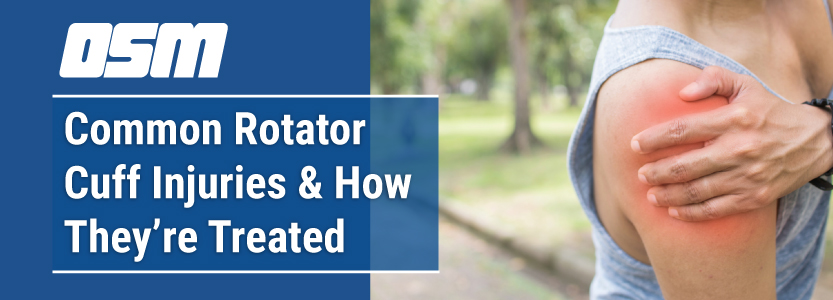Your rotator cuff is made up of the muscles and tendons in your shoulder, which connect your upper arm bone (humerus) with your shoulder blade (scapula). The rotator cuff holds the ball of your humerus firmly in your shoulder socket. The term ‘rotator cuff injury’ can mean many different things and includes any type of irritation or damage to your rotator cuff muscles or tendons. About half the time, a rotator cuff injury can heal with the help of physical therapy. But sometimes, surgery is needed to repair the injury.
Rotator cuff pain is one of the most common shoulder problems in adults.
Types of Rotator Cuff Injuries
Rotator cuff injuries can be acute (traumatic) or chronic (ongoing) injuries that happen over time. These injuries include:
Diagnosing a Rotator Cuff Injury
If you have shoulder pain that’s limiting your day-to-day activities, our shoulder specialists will perform a thorough evaluation to determine if you’ve damaged your rotator cuff. This includes understanding your symptoms, a physical exam of your shoulder, and may also include imaging studies, such as an x-ray or MRI.
Rotator Cuff Injury Treatment
The best treatment for a rotator cuff injury depends on what your doctor finds during your evaluation and may include rest, medications, physical therapy, injections in the joint, and/or surgery. Rotator cuff injuries can take several weeks to several months to heal depending on the specific injury. Most rotator cuff tears will not heal on their own, but many times, you can relieve your pain and restore the function of your shoulder without surgery.
Rest and Physical Therapy
Rotator cuff injuries are usually treated first with rest and physical therapy. Your physical therapist will give specific exercises designed to help heal your injury, improve the flexibility of your rotator cuff and shoulder muscles, and provide balanced shoulder muscle strength. They also may recommend using non-steroidal anti-inflammatory medications (NSAIDS) or ice packs/heat packs to control the inflammation. Depending on the severity of your injury, physical therapy may be required for several weeks to several months.
Steroid Injections and Surgery
If rest and physical therapy don’t fully heal your injury, your doctor may recommend other treatments, including:
- Steroid injections: Depending on the severity of your pain, your doctor may use a corticosteroid injection to relieve inflammation and pain in your shoulder region.
- Surgery: If you have a large muscle tear in your rotator cuff, you may need surgery to repair the tear. During this type of surgery, doctors also may remove any bone spurs or calcium deposits.
Night Time Shoulder Pain
Many people with rotator cuff injuries have a hard time sleeping, but night time pain can often be relieved with a few simple steps. Try icing your shoulder for 15-20 minutes and taking non-steroidal anti-inflammatory medications, like ibuprofen, before bed to help ease the pain. Many people also find that experimenting with their sleep position can help them get some rest.
The Orthopedic & Sports Medicine Center of Oregon is an award-winning, board-certified orthopedic group located in downtown Portland Oregon. We utilize both surgical and nonsurgical means to treat musculoskeletal trauma, spine diseases, foot and ankle conditions, sports injuries, degenerative diseases, infections, tumors and congenital disorders.
Our mission is to return our patients back to pain-free mobility and full strength as quickly and painlessly as possible using both surgical and non-surgical orthopedic procedures.
Our expert physicians provide leading-edge, comprehensive care in the diagnosis and treatment of orthopedic conditions, including total joint replacement and sports medicine. We apply the latest state-of-the-art techniques in order to return our patients to their active lifestyle.
If you’re looking for compassionate, expert orthopedic and podiatric surgeons in Portland Oregon, contact OSM today.
Phone:
503-224-8399
Address
17355 Lower Boones Ferry Rd Suite 100A
Lake Oswego, OR 97035
Hours
Monday–Friday
8:00am – 4:30pm



